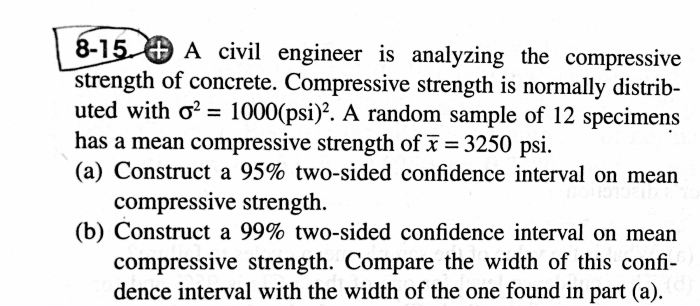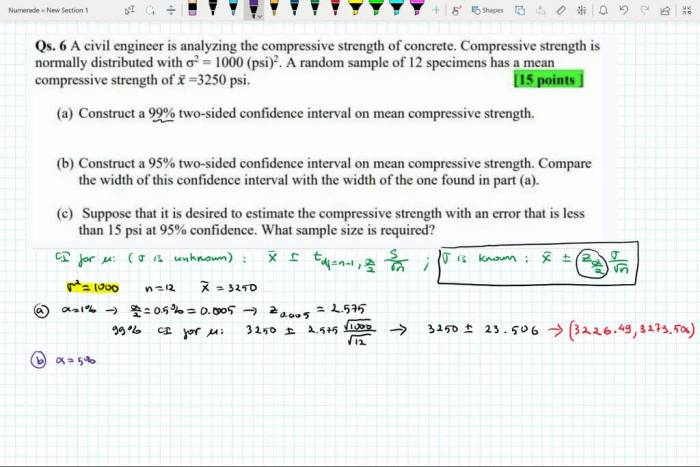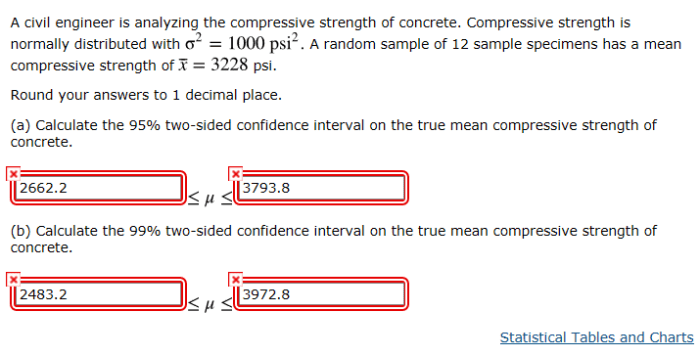A civil engineer is analyzing the compressive strength of concrete, a crucial aspect of concrete engineering that ensures the safety and longevity of concrete structures. This analysis involves determining the concrete’s ability to withstand compressive forces, a key factor in structural design and quality control.
The compressive strength of concrete is influenced by various factors, including the water-cement ratio, aggregate type and gradation, cement type and content, and curing conditions. Understanding these factors and their impact on concrete’s strength is essential for optimizing concrete mix designs and ensuring the desired performance of concrete structures.
Introduction

The compressive strength of concrete is a critical parameter in concrete engineering, as it determines the ability of concrete to withstand compressive loads. Civil engineers play a vital role in analyzing the compressive strength of concrete to ensure the safety and integrity of concrete structures.
Methods of Compressive Strength Analysis

Cylinder Compression Test
The cylinder compression test is the most common method used to determine the compressive strength of concrete. In this test, a cylindrical concrete specimen is subjected to a compressive load until it fails. The compressive strength is calculated as the maximum load divided by the cross-sectional area of the specimen.
Cube Compression Test
The cube compression test is another method used to determine the compressive strength of concrete. In this test, a cubic concrete specimen is subjected to a compressive load until it fails. The compressive strength is calculated as the maximum load divided by the cross-sectional area of the specimen.
Split Cylinder Test
The split cylinder test is a method used to determine the tensile strength of concrete. In this test, a cylindrical concrete specimen is subjected to a compressive load applied along its diameter. The tensile strength is calculated as the maximum load divided by the cross-sectional area of the specimen.
Factors Affecting Compressive Strength: A Civil Engineer Is Analyzing The Compressive Strength Of Concrete

Water-Cement Ratio
The water-cement ratio is one of the most important factors that affect the compressive strength of concrete. A lower water-cement ratio results in a higher compressive strength, as it reduces the porosity of the concrete.
Aggregate Type and Gradation, A civil engineer is analyzing the compressive strength of concrete
The type and gradation of the aggregate used in concrete can also affect its compressive strength. Aggregates with a rough surface texture and a well-graded distribution can improve the compressive strength of concrete.
Cement Type and Content
The type and content of cement used in concrete can also affect its compressive strength. Different types of cement have different strengths, and a higher cement content will result in a higher compressive strength.
Curing Conditions
The curing conditions of concrete can also affect its compressive strength. Concrete that is cured in a moist environment will have a higher compressive strength than concrete that is cured in a dry environment.
FAQ Overview
What is the significance of compressive strength analysis in concrete engineering?
Compressive strength analysis is crucial in concrete engineering as it provides insights into the concrete’s ability to withstand compressive forces, a primary consideration in structural design. It helps ensure the safety and integrity of concrete structures.
What factors influence the compressive strength of concrete?
The compressive strength of concrete is affected by several factors, including the water-cement ratio, aggregate type and gradation, cement type and content, and curing conditions. Optimizing these factors is essential for achieving the desired concrete strength.
How is compressive strength analysis conducted?
Compressive strength analysis involves testing concrete specimens under controlled conditions using methods such as cylinder compression tests, cube compression tests, and split cylinder tests. The results of these tests provide valuable data for evaluating the concrete’s compressive strength.